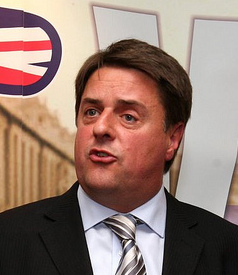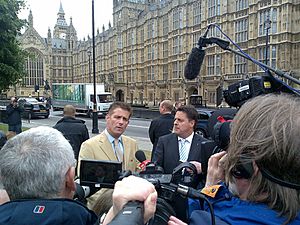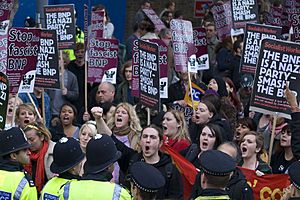Nick Griffin facts for kids
Quick facts for kids
Nick Griffin
|
|
|---|---|

Griffin at a BNP conference, 2009
|
|
| Vice president of the Alliance for Peace and Freedom |
|
| Assumed office 2018 |
|
| President | Roberto Fiore |
| President of the British National Party | |
| In office 21 July 2014 – 1 October 2014 |
|
| Chairman of the British National Party | |
| In office 27 September 1999 – 21 July 2014 |
|
| Preceded by | John Tyndall |
| Succeeded by | Adam Walker |
| Member of the European Parliament for North West England |
|
| In office 4 June 2009 – 2 July 2014 |
|
| Preceded by | Den Dover |
| Succeeded by | Louise Bours |
| Personal details | |
| Born |
Nicholas John Griffin
1 March 1959 Barnet, Hertfordshire, England |
| Political party |
|
| Spouse |
Jackie Griffin
(m. 1985) |
| Children | 4 |
| Alma mater | Downing College, Cambridge |
| Profession | Politician |
Nicholas John Griffin (born 1 March 1959) is a British politician. He is known for his involvement in far-right politics. He was the chairman of the British National Party (BNP) from 1999 to 2014. He also served as a Member of the European Parliament (MEP) for North West England from 2009 to 2014.
Born in Barnet, England, Griffin was educated at Woodbridge School. He joined the National Front political party when he was 14. After graduating from the University of Cambridge, he worked for the party. He left the National Front in 1989 and joined the BNP in 1995, becoming its leader four years later.
Griffin has been a controversial figure. In 1998, he was involved in a legal case over materials he shared that were seen as likely to encourage racial hatred. He has been criticized for many of his comments. After becoming leader of the BNP, he tried to change some of his earlier positions, including his denial of the Holocaust. Since 2018, he has been the vice-president of the Alliance for Peace and Freedom, a European political party.
Contents
Early Life and Education
Nick Griffin was born on 1 March 1959 in Barnet. His family moved to Southwold in Suffolk when he was eight. His father, Edgar Griffin, was a member of the Conservative Party and served as a local councillor. His mother, Jean, was also involved in politics and ran as a BNP candidate in several elections.
Griffin attended Woodbridge School and later won a scholarship to Saint Felix School. He joined the National Front in 1974.
In 1977, Griffin began studying history and then law at Downing College, Cambridge. At Cambridge, he founded a student group for the National Front. He graduated with a degree in law. He was also a skilled boxer and won a boxing blue for competing against Oxford University.
Political Career
Early Political Work
After graduating from Cambridge, Griffin worked for the National Front. By 1978, he was a national organiser for the party. In 1980, he became a member of the party's leadership group. He ran for a seat in Parliament for the National Front in 1981 and 1983 but was not successful.
In the 1980s, Griffin and other members became interested in the ideas of Italian politician Roberto Fiore. This led to a split in the party. Griffin left the National Front in 1989. For a few years, he stepped away from politics.
Joining the British National Party
Griffin returned to politics in 1993. In 1995, he joined the British National Party (BNP) at the invitation of its founder, John Tyndall. Griffin became the editor of two magazines for the party.
In 1999, Griffin challenged Tyndall for the leadership of the BNP. Griffin wanted to make the party more appealing to voters. He aimed to move the party away from its extreme image. He won the election with 70% of the vote and became the new leader.
As leader, Griffin made changes to the party's policies. For example, he changed the policy of forcing ethnic minorities to leave the country to a voluntary one. He wanted the BNP to be more like other far-right parties in Europe, such as the French Front National.
Elections and European Parliament
After becoming BNP leader, Griffin ran in many elections. In a 2001 general election in Oldham West and Royton, he came in third with 16% of the vote.

In the 2009 European Elections, Griffin was elected as a Member of the European Parliament (MEP) for North West England. The BNP won two seats in the European Parliament for the first time. This was a major victory for the party. Griffin said it showed they could succeed despite pressure and opposition.
In the 2010 general election, he ran for the Barking seat in Parliament but finished in third place.
Later Career and Leaving the BNP
Griffin lost his seat in the European Parliament in the May 2014 election. In July 2014, he stepped down as BNP leader and became the party's president. However, on 1 October 2014, the party announced it had expelled him.
After leaving the BNP, Griffin founded a new group called British Unity. In 2015, he helped create the Alliance for Peace and Freedom (APF), a European political party. In 2018, he was elected as the vice-president of the APF.
Public Appearances and Debates
Griffin was often invited to speak at universities and on television, which usually led to protests.
University Debates
After becoming BNP leader, Griffin was invited to debate at several universities, including the Cambridge Union Society. These invitations were often controversial. A planned debate at the University of Cambridge in 2002 was cancelled due to threats of protests.
In 2007, the Oxford Union invited Griffin and historian David Irving to speak about free speech. The invitation was condemned by many groups. On the night of the debate, hundreds of people protested outside. Police had to block the entrances to the building to keep order.
Appearance on Question Time

On 22 October 2009, Griffin appeared on the BBC's popular debate show, Question Time. He was on the panel with other politicians and public figures. The BBC's decision to invite him caused a huge debate.
Before the show, about 500 people protested outside the BBC building. The programme was watched by over 8 million people, much more than its usual audience. During the show, Griffin was questioned about his past comments on the Holocaust and his views on Islam.
The next day, Griffin said the show was like a "lynch mob" and that the audience was unfair. He said he would make a formal complaint to the BBC.
Policies and Views
Griffin described himself as a "moderniser" who wanted to change the BNP's image. He shifted the party's focus from just immigration to defending what he called "traditional principles" against modern ideas.
As chairman of the BNP, Griffin had full control over the party's decisions. He tried to form alliances with other right-wing parties in Europe, like Vlaams Belang in Belgium and Jobbik in Hungary.
Griffin has strong views on many topics. He has spoken out against multiculturalism, which is the idea of different cultures living together in one society. He has also expressed controversial views on global warming, calling it a "hoax" used by governments to tax and control people.
He once stated his political ideas could be summed up by the Fourteen Words, a popular slogan among white nationalists.
Personal Life
Griffin is married to Jackie Griffin, who has worked as his assistant. They have four children and live in Shropshire. In January 2014, he was declared bankrupt. In 2017, Griffin was banned from entering Hungary because the government saw him as a national security threat.
Elections Contested
UK Parliament elections
| Date of election | Constituency | Party | Votes | % | Source(s) | |
|---|---|---|---|---|---|---|
| 22 October 1981 by-election | Croydon North West | National Front | 429 | 1.2 | ||
| 1983 general election | Croydon North West | National Front | 336 | 0.9 | ||
| 23 November 2000 by-election | West Bromwich West | BNP | 794 | 4.2 | ||
| 2001 general election | Oldham West and Royton | BNP | 6,552 | 16.4 | ||
| 2005 general election | Keighley | BNP | 4,240 | 9.2 | ||
| 2010 general election | Barking | BNP | 6,620 | 14.6 | ||
Welsh Assembly elections (Additional members region; party list)
| Date of election | Region | Party | Votes | % | Result | Source(s) | |
|---|---|---|---|---|---|---|---|
| 2007 Welsh Assembly election | South Wales West | BNP | 8,993 | 5.5 | Not elected | ||
European Parliament elections (Multi-member constituency; party list)
| Date of election | Region | Party | Votes | % | Result | Source(s) | |
|---|---|---|---|---|---|---|---|
| 2004 European election | North West England | BNP | 134,959 | 6.4 | Not elected | ||
| 2009 European election | North West England | BNP | 132,094 | 8.0 | Elected | ||
| 2014 European election | North West England | BNP | 32,826 | 1.9 | Not elected | ||
See also
 In Spanish: Nick Griffin para niños
In Spanish: Nick Griffin para niños
 | William Lucy |
 | Charles Hayes |
 | Cleveland Robinson |

